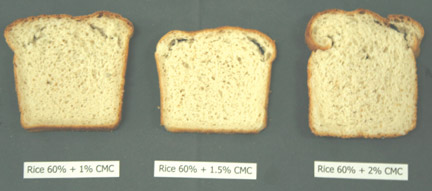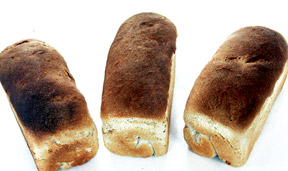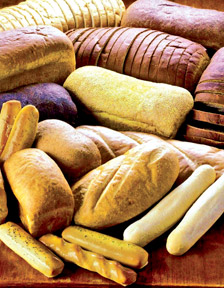Rice flour to be popularised
By L.S Ananda Wedaarachchi

Health Minister Maithripala Sirisena |

Housing & Construction Minister Wimal Weerawamsa |
Health Minister Maithripala Sirisena directed his officials last week
not to allow the sale of wheat flour-based food items, such as bread,
buns and cakes in hospital canteens. His decision was based on the need
to motivate the people to depend on rice and discourage the consumption
of wheat flour production.
Food scientists and doctors are of the opinion that the consumption
of wheat flour products has been identified as a cause for many
non-communicable diseases such as high blood pressure, renal failure and
obesity.
Wheat flour and supplementary food items were needed when Sri Lanka
was not self sufficient in rice. Billions of rupees were spent to import
items even on short term and long term credit lines, some foreign
sources and monetary institutions encouraged Sri Lanka to import their
products such as wheat, to the detriment of domestic food production.
Housing and Construction Minister and Jathika Nidahas Peramuna leader
Wimal Weerawamsa and JNP political committee member Piyasiri Wijenayeka
recently said that consumption of wheat flour was another form of
terrorism which deals a serious blow to the Sri Lankan economy.
They urged President Mahinda Rajapaksa and Health and Prison Reforms
Ministers to introduce rice flour based food to hospital canteens and
prisons.
Sri Lanka spent Rs. 29,769 million to import wheat flour last year.
Although the campaign to discourage wheat flour consumption launched as
early as 1996 has failed to produce the desired results.
|

Rice bread produced at Department of Food Science and
Technology, University of Peradeniya.
|
According to the Central Bank sources the annual import of wheat
flour had sharply increased during the 2000 to 2009 decade.
Year MT Rs/Million
2000 922 9625
2002 993 12427
2004 993 18536
2006 1200 20679
2007 952 25891
2008 919 40563
2009 1026 29769
Countries such as Japan, Germany, Korea, China and Thaiwan had
correctly identified their domestic problems before they achieved
economic independence.

Bread produced by wheat flour |

Wheat flour based food bread buns |
After eradicating the three decade long terrorism under the
leadership of President Mahinda Rajapaksa, Sri Lanka too has identified
its path to development while other major economies including that of
USA were beset with economic recession during the last five years. Sri
Lanka economy while recorded 7.5 increase in GDP did not experience
severe shortages as other regional countries did Sri Lanka was insulated
against such crisis due to the timely implementation of the "Api Wavamu
Rata Nagamu" agricultural development program.
According to the latest statistics released by the Agriculture
Ministry, year 2010 has recorded a bumper paddy harvest exceeding the
local requirement. The country's 2010 rice production amounted to MT.
2772 as against the domestic requirement of MT. 2330 a spokesman of the
Agriculture Ministry said.
Paddy Production - Yala Maha both seasons
Year Cultivated land HA MT./Thousands
2000 878 2860
2002 852 2859
2004 779 2628
2006 910 3342
2007 816 3131
2008 1053 3878
2009 978 3652
(Central Bank Annual Report)
Meanwhile the government has launched a program to popularise rice
flour based food products among the people. Food Promotion Board FPB
Chairperson Kumudini Gunasekera said that ten flour processing mills to
ensure regular supply of rice flour to the market will be set up soon in
the agricultural districts. The first rice flour processing centre was
set up at Kalankuttiya, Anuradhapura.
The next rice flour mills will be set up at Ambalantota and
Kilinochchi, she said that a project has been launched to educate the
people on how rice flour can be used to make stringhoppers, cakes,
thosai, rotti and pittu. Any organisation interested in the multiuse of
rice flour could seek our assistance, she said.
She said that a flour rice sales centre was also opened at No. 21,
Galle Road, Dehiwala. She said that the consumption of wheat flour among
the estate plantation community is high. Due to its affordable price and
the convenience and with which rotti, their favourite could be made,
wheat flour has become the principal source of food for the plantation
workers, she said.
Dr. Rohitha Prashanta, Senior Lecturer, Department of Food Science
and Technology, Faculty of Agriculture, University of Peradeniya (email-rop-bd
@yahoo.com) said that bread could be made with seventy percent of rice
flour and thirty percent of wheat flour as has been confirmed by recent
research, he said.
Dr. Prashanta said the production of rice flour based bread and other
food items largely depends on the regular supply of rice flour to the
domestic market. Sri Lankans who were traditionally accustomed to
consume three rice meals daily switched on to bread and rotti made out
of wheat flour due to cross-culture influence. Sri Lanka consumes more
than 864,000 MTs of wheat flour worth over Rs. 14,200 million. Multi
National Companies spend millions of rupees to propagate the virtues of
wheat flour consumption, Dr. Prashanta said.
In Sri Lanka's per capita daily rice consumption is 270g and wheat
flour consumption 110g. Of the total wheat flour consumption 50 percent
used for bread and other bakery products. Bakery industry provides
direct and indirect employment to a large number of people, he said. The
price hike of wheat flour and bread is a common senario in the past. The
price of a bread was increased four times by Rs. 10 within a period of
10 months. There is no price control for bread at present and a bread is
available from Rs. 60 to Rs. 175 in the market.
The Chairman of Bakery Owners Association N. K. Jayawardena said more
than 100,000 are engaged in the bakery industry. When the wheat flour
prices are increased by the Prima Company, it has its impact on the
price of bread. The Rs. 1.50 subsidy granted to bakery owners also has
been withdrawn, he said.
Finagle Lanka Pvt. Ltd. Managing Director Mahinda Ranasingha said
that they would support the government's people friendly decisions. The
patients and the schoolchildren will switch on to rice based food items
or Kadala or Munata, will it be a success, he said.
Ranasingha who introduced the Kurakkan based bread to his consumers
said they conducted research and experiment for the feasibility of a
rice flour based bread.
The consumer preference is the prime factor, he said. The government
should encourage the local producers granting tax and duty concessions
to import machinery and raw material. Gluton which used making bread
with kurakkan or rice flour should be made a duty free item as requested
by the Bakery owners, he said. |

